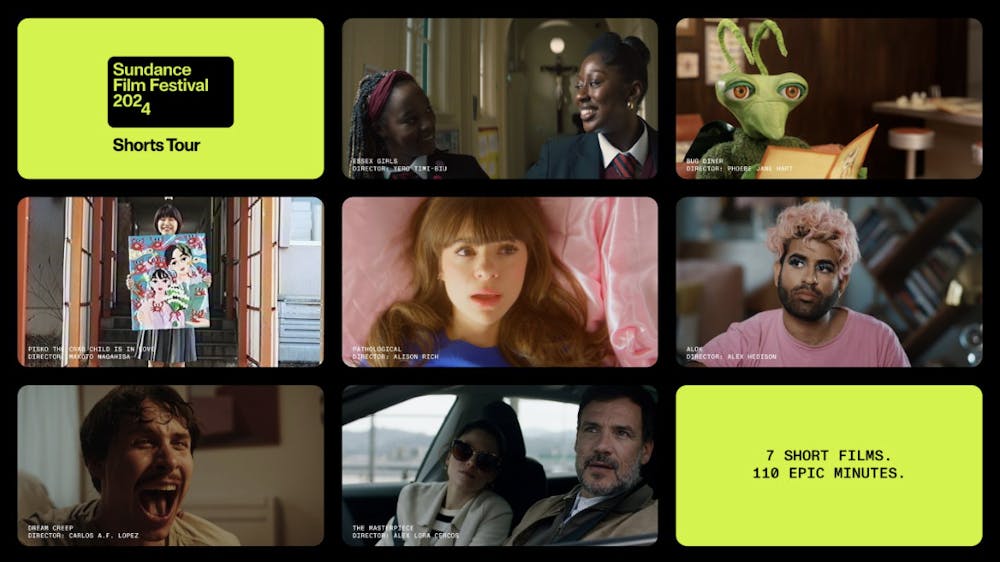Middlebury’s Hirschfield International Film series opened Thursday, Sept. 26 to a packed theater, as Sundance Film Festival’s 2024 Short Film Tour — currently traveling its way across the country — made a gracious stop at Dana Auditorium. Of the seven shorts shown, four were undeniably worth further reflection.
Where to start with “Bug Diner”? The incredibly choreographed and animated stop-motion film begins mildly enough. The diner in question is cute and enigmatic, the bugs are whispery and unreadable. But as we follow the restaurant’s fly waiter down into the mole chef’s kitchen den, that original charm distorts into obscenity as you realize that you are in for five minutes of bug pornography. The editing and music is dynamic, thrusting the film forward with a vague sexual energy of its own. It is difficult and it is a joy to watch the world of bugs devolve into a sexually experimental and emotionally complex rapture. Upon a necessary — and maybe unwilling — reflection, one realizes, however, that it wasn't all lude. “Bug Diner” does have something to say. It rips from the collective id of humanity all the most decadent, devious and typical sexual and emotional intrigues, placing them in the bizarre world of moles, flies, grasshoppers and a weird lactating squirrel-thing. ‘What does it all mean?’ is a harder question to answer. Instead, just let it all happen to you; laugh or avert your eyes, you’ll probably end up doing both.
“The Masterpiece” is a skillfully composed thriller with a fleeting likeness to Bong Joon Ho’s “Parasite” or Kurosawa’s “High and Low.” Leo and Diana, a wealthy white couple, invite scrap collectors Salif and Youssef to their house, offering them progressively more broken junk until their van can fit nothing else. Diana notices Salif has a potentially precious painting, and a tense negotiation follows, ending with Salif giving up the chance for millions in favor of the guarantee of a far smaller sum. The racial and class conflicts embroider the film, and necessarily so, as if there was no way to artfully dance around the issue. The muted plucked bass beats with your heart for the whole 20 minutes as your brain tries to decipher the illegible gazes shared between characters: Who will break bad first?
Salif’s ultimate choice was not predictable, though it was an inevitability. You cannot help but hold out some useless hope for the scrap collectors, but once Salif accepts what is essentially Leo’s loose pocket change, you feel that he has made the right choice, the only choice. One feels as if the $1,000 Salif earns will mean more to him than the millions that the white couple may or may not acquire. And regardless of whether the painting will sell, the money remains where it is, where society deems it belongs, in privileged hands.
“ALOK” is an autobiographical short about poet, political activist, and comedian Alok Vaid-Menon. Alok opens by emphasizing the importance of the pronoun “we,” speaking to and for humanity on behalf of the marginalized, with the message of love. Alok and their friends’ energetic timbre, eclectic style and fantastically bohemian meditations on life are magnetic. Alok’s poetry is the thematic high point of the film. The poems are read with intent and are full of pain, each word hitting with the weight of experience. It feels necessary to platform Alok’s voice in response to the history of discrimination and violence suffered by the transgender community, and quite a voice they have — poetic, honest, passionate and kind.
The film’s opening is strong, but “ALOK” plateaus as its conceptual ambitions are razed by its runtime. The editing keeps viewers at an arm’s length, which creates an experience more akin to watching a commercial than a Sundance short. In the moments the narrative zooms out, images of the Holocaust, the 21st century refugee crisis and civil rights protests flicker so quickly across the screen you feel as if you have been slapped in the face by issues which demand far more attention.
“Pisko The Crab Child is in Love” is a more than worthy finale for the 110 minute tour. The film is wonderfully sincere and injected with a kind of careless energy that is rapidly infectious. Pisko’s father is a crab and her mother is a human, thus making her, naturally, half crab. Though this fact only physically manifests in her need to hold up two pincer-like peace signs in every picture she is in, the abnormality of her heredity sends her down a painful search for love. A search that ends when Pisko and her close friend Kubokayo confess feelings for each other. The short is filmed in the style of old homemade camcorder footage, the narrative quirky, unpredictable and reckless. There's a certain honesty about the film which betrays the merits of auteurship. It is perhaps the only film on the tour which feels like a truly singular, personal artistic vision. The editing is fast-paced, the shot composition is both incredibly particular and hastily maximal and the music pivots from angry to sad to frantic. The film ends with Pisko professing what an embarrassment it is to talk about love, but this may be one of the least embarrassing attempts I’ve seen put to the screen.
The Sundance Short Film Tour was the perfect way to kick off this year’s Hirschfield International Film Series. Among the selections, three films earned awards at this year's Sundance Film Festival: “The Masterpiece” won the Grand Jury Prize; “Bug Diner” won the award for animation; and “Pisko the Crab Child Is In Love” won the award for directing. But each film in the tour demanded attention and proved its place among the others.
And ultimately the victory is yours; we are lucky to have a local institution showcasing the international cinema which would otherwise be lost to us in the modern deluge of media, music and meaning.




